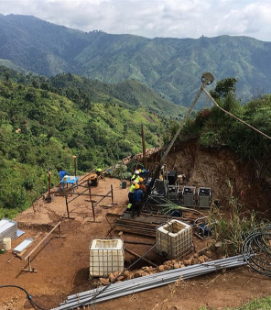Strategic Program Areas
ACEMP has three broad thematic focus’ supported by six strategic program areas applied to support targeting and prioritising of the Centre’s strengths in addressing development needs through the lenses of the extractive industries sector.
Focus Areas

Minerals and Mining Development Program (MMDP)
ACEMP provides a platform for mineral development value chain stakeholders from the mining industry, central government and local governments, parliament, civil society, the media, academia and host mining communities to engage each other and participate in policy dialogue that lays a foundation for the sustainable development of the mining sector. The program focuses on finding solutions for the co-existence of mining activities with other sectors of the economy such as agriculture, and seeks to solve a key ‘wicked’ problem in the mining sector: How can artisanal miners co-exist and work productively with Large Scale Mining companies?

Oil and Gas Development Program
ACEMP aims to promote the emerging petroleum sector in Uganda to allow all stakeholders to participate in policy formulation, decision making and actual development of petroleum resources. Under this Program, ACEMP has partnered with the National Planning Authority (NPA) to develop an annual Petroleum Sub-sector Scorecard for Uganda to assess the performance of the sub-sector and identify key interventional areas aimed at enhancing the contribution of the sector towards Uganda’s socio-economic transformation. This scorecard assesses the performance of the sub-sector along identified key indicators that are aligned with Uganda’s national development priorities.
Strategic Program and Activity Areas
Themes
Governance and regulation
Improved governance and accountability through effective and transparent regulation and management of extractive industries.
Community, socio-economic and environmental sustainability
Strengthened economic, social and environmental outcomes from mining for mineral rich sub-national governments and host communities through education and training, local institutional oversight strengthening, and capacity building.
Institutional effectiveness
Implementation of policies, laws, regulations and processes that ensure that resource development results in substantial, inclusive and sustainable development for all Ugandans.
Regional and local economic and social development
Outcome: Alignment of sector economic activity with broader societal development objectives.
Through processes such as: localised planning and execution of all extractive projects; strengthening local participation and monitoring of projects; local content and enterprise development; formalisation and regulation of small-scale and artisanal mining activities.
Sub-national governance of the mining sector
Outcome: Enhancement of governance capacity at local and regional levels involving multiple stakeholders. Focused on: local accountability; understanding and monitoring of mining operations; capacity to manage agreement negotiation and implementation processes.
Minerals policy, regulation and agreements
Outcome: Development of well-designed sector policy and regulatory frameworks. That establish platforms for: a transparent licensing and management of exploration and mining rights; participatory negotiation of project agreements and approvals; equitable tax regimes and revenue management frameworks; and promotion of responsible mineral supply chains.
Community engagement and consultation
Outcome: Improvements in the processes used by industry and government stakeholders to engage with local communities in respect of their human rights and entitlements. To ensure: understanding and communication of impacts at the local level; fair and effective community agreements processes; open and transparent engagement with local and Indigenous communities.
Health and safety of workforces and resources communities
Outcome: Implementation of appropriate regulatory and management approaches for occupational health and safety in the resources sector. Including: regulatory frameworks for OHS built on modern risk management principles; community health and resource projects; operational aspects of managing and monitoring safety practices.
Environmental management and regulation
Outcome: Improvements in the capacity of all stakeholders to understand and manage the environmental aspects of resource projects. Including: effective and inclusive environmental impact assessment processes; integration of land and water management; mined land rehabilitation practices; operational environmental management and monitoring as well as co-existence of extractive industries sector with other economic land users such as agriculture and pastoralism.